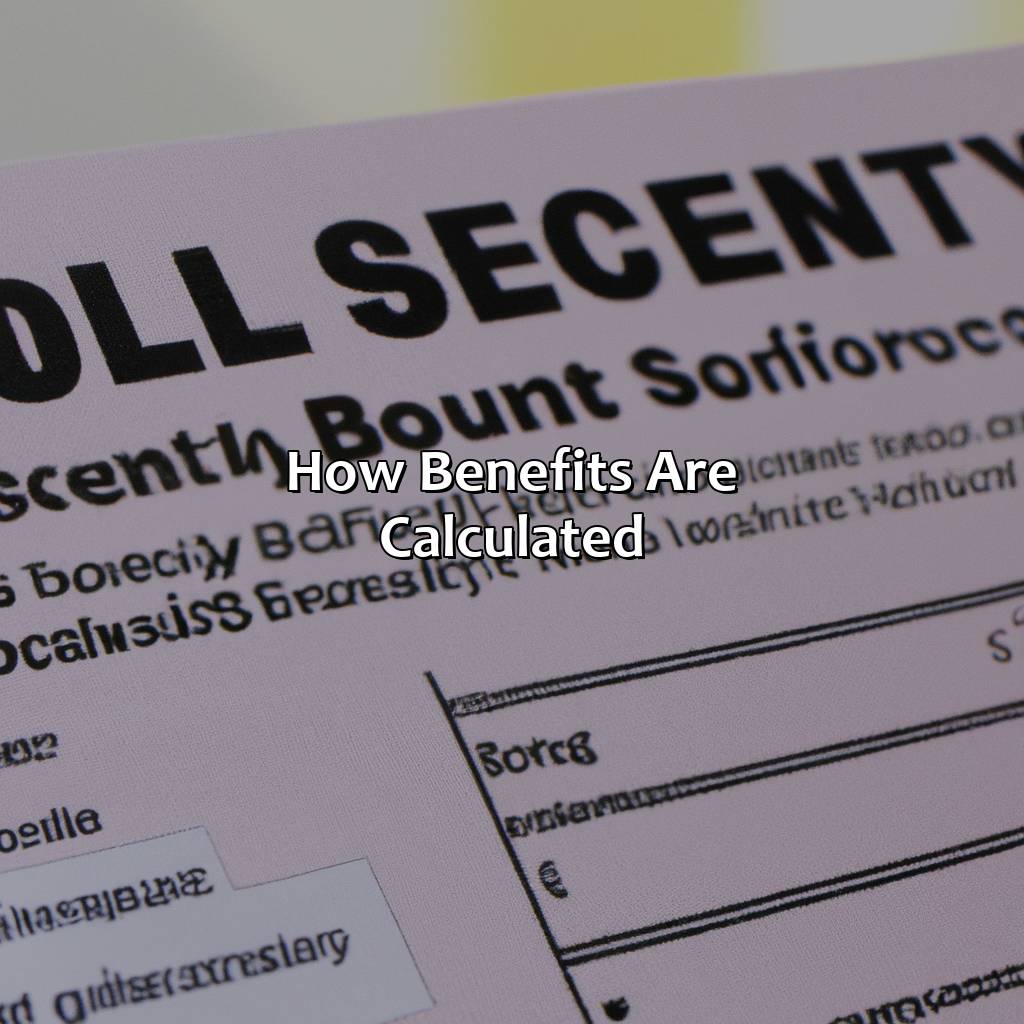When Can I Receive Full Social Security Benefits?
Key takeaways:
- You can receive full Social Security benefits once you reach full retirement age, which varies based on your birth year. For those born in 1960 or later, it’s 67 years old.
- If you choose to receive benefits before reaching full retirement age, your benefits may be reduced if you earn above a certain income threshold. However, the reduction is temporary, and your benefit amount will be recalculated once you reach full retirement age.
- In addition to retirement benefits, Social Security also provides disability and survivor benefits. These benefits are based on different eligibility criteria and may have different payout amounts.
Are you worried about when you’ll receive your full Social Security benefits? Read on to find out the eligibility criteria and other information to help you understand this important retirement income source. You may be closer to getting the full benefits you need sooner than you think!
Eligibility for Full Social Security Benefits
To know your eligibility for full social security benefits, age requirements and work status must be taken into account. Disability and survivor benefits also offer further options. This section covers “Eligibility for Full Social Security Benefits” with sub-sections about:
- “Age Requirements for Full Benefits,”
- “How Working Affects Benefits,” and
- “Disability and Survivor Benefits.”
Here, you can learn when you can start getting full social security benefits.

Image credits: retiregenz.com by David Washington
Age Requirements for Full Benefits
Receiving Social Security Benefits in Full – the Conditions to be Met
To receive full social security benefits depends on individual circumstances. Reaching full retirement age (FRA), generally between 66 to 67 years, allows you to collect the entire benefit you are entitled to every month. Alternatively, if you claim early at 62, your amount will be reduced and remain low for as long as you continue receiving payments. Waiting until after FRA nets you delayed retirement credits (DRCs), increasing the payout beyond monthly maximum calculations previously decided.
It is common knowledge that retirement age determines payment of full social security benefits but delving deeper into specific details proves far more useful. For instance, collecting before FRA affects benefit amounts and is known as early entitlement while delaying enables DRCs which increase payments per month. To note, DRCs accrue up until age 70 only so delaying payment past this threshold doesn’t make financial sense.
Pro Tip: To receive maximum SS benefits, plan your retirement finances carefully by consulting with a professional to identify best time periods crucial for gaining DRCs while having suitable income streams available. Work hard now, regret it later when it only slightly increases your Social Security benefits.
How Working Affects Benefits
When you work while receiving Social Security benefits, your earnings may affect your monthly payments. The limit for working without reducing the benefits depends on the age at which you start collecting. The Social Security Administration reduces the amount of payment by $1 for every $2 earned over the annual limit. However, this reduction is only temporary until you reach full retirement age.
Furthermore, once you reach full retirement age, your benefits will no longer be reduced based on earnings. Any money that was withheld because of earning limits will be added back to your monthly payment from that point onwards. The good news is that the reduced amount isn’t gone forever; it’s simply deferred.
If someone tried to work and earn above their limit before reaching full retirement age, they had a tough break with no say in how much their salary would contribute towards their Social Security expenses. Ultimately, every decision must be made based on an individual’s unique financial circumstances and goals.
If you’re looking for a disability or survivor benefits joke, sorry to disappoint, but that’s just not in my wheelhouse.
Disability and Survivor Benefits
Individuals who are unable to work due to disability or are survivors of a deceased worker may be eligible for Social Security Disability Insurance or Survivor benefits. These benefits are designed to provide financial assistance to those who are unable to earn a living due to illness, injury, or loss of a loved one.
To qualify for Disability benefits, applicants must meet specific medical criteria and have sufficient work credits. In contrast, Survivor benefits may be available if the deceased worker had earned enough work credits before passing away. These benefits can provide much-needed income to surviving spouses and dependent children.
It’s important to note that disabled individuals can only receive Disability benefits until they reach full retirement age when they will transition to regular Social Security retirement benefits. Survivors’ benefits may also end once beneficiaries reach the age of 18 (or 19 if still in high school).
Don’t miss out on potential support for yourself or your family. If you believe you may be eligible for Disability or Survivor benefits, contact the Social Security Administration as soon as possible to begin the application process.
Calculating your social security benefits is like trying to solve a Rubik’s Cube blindfolded, while riding a unicycle on a tightrope over a shark-infested pool.
How Benefits are Calculated
Work out your social security benefit? You must be familiar with how it is worked out. This part will look at the important aspects that decide your regular benefit. We look at the basic insurance amount, late retirement credits, and cuts for early retirement.

Image credits: retiregenz.com by Harry Washington
Primary Insurance Amount
For those eligible, the amount received from Social Security benefits is based on what’s known as the Main Benefit Calculation or MBC. The MBC determines the Primary Insurance Amount (PIA), which refers to the base amount received in monthly benefits. PIA is derived according to a formula that factors in one’s lifetime earnings history and age at full retirement age.
PIA is also based on an inflation-adjusted formula that takes into account three fixed percentages of average indexed monthly earnings (AIME) from different eras of someone’s work history. The formulas aim to level out adjustments due to inflation and provide an accurate reflection of how much in benefits one has earned during their working life.
It’s important to note that while receiving early Social Security benefits before full retirement age may result in a reduced PIA, working beyond full retirement age can increase one’s monthly benefit payments beyond their calculated PIA.
Pro Tip: Consider speaking with a financial planner when deciding whether to begin receiving Social Security benefits early or continuing to work past full retirement age to maximize your overall potential lifetime benefit amount. Waiting to retire may feel like a slow torture, but at least your delay can lead to some extra dough thanks to those delayed retirement credits.
Delayed Retirement Credits
The Later Benefit Boost – The Hidden Perk in Social Security Benefits
If you delay receiving your Social Security benefits until after your full retirement age, you can get a substantial increase in monthly payments. Commonly known as “delayed retirement credits,” you can earn up to 8% per year in additional benefits by waiting to claim.
By delaying your retirement benefits, you receive higher monthly income for the rest of your life. Additionally, these credits are automatic after full retirement age and continue accumulating up to age 70.
A significant advantage of delayed benefit credits is the opportunity to earn growth on deferred income. As people live longer today than previous generations, deferring claim affords retirees the ability to prolong and secure their financial well-being.
Keep in mind that if there’s an urgent need for immediate cash flow, claiming early might be essential. But before making any choices on whether or not to delay receiving one’s retirement credit, carefully analyze all of one’s options and seek advice from trusted financial advisors or certified planners.
Don’t miss out on the ability to maximize your lifetime income! Consider delaying social security payments and enjoy a more financially secure future. Retire early and enjoy the discounts…on your social security benefits.
Reductions for Early Retirement
Many Reasons for Reduced Social Security Benefits upon Early Retirement
Retiring before reaching full retirement age (FRA) can lead to reduced social security benefits. Several circumstances could cause lower payments, such as insufficient work credits, earning excessive income too early, or fewer accumulated years of employment.
- Age effects – Retiring at age 62 instead of FRA reduces benefit compensation by 30%.
- Minimum work-credit threshold – Ten years’ minimum totaling 40 credits define social security eligibility based on earnings.
- Earnings excess limit – Before reaching FRA, if annual gains top $18,960 in earning notwithstanding the evidence of retirement (income from non-working sources), payout decreases by $1 for every $2 earned past this limit.
- Benefit cutback due to fewer work years – Social Security averages out a lifetime earnings record over 35 years; zeros replace no or little income recorded in lesser-working-years spanned over the full employment tenure.
By being cognizant of these conditions causing decreased social security benefits when retiring early, better financial planning aligned with possible outcomes can help maintain adequate cash flow after leaving the workforce.
A study shows that approximately one-third of seniors rely on their social security benefits to provide them with more than ninety percent of their total income. Applying for Social Security Benefits: Because retirement isn’t the only thing that’s guaranteed in life.
Applying for Social Security Benefits
Apply for Social Security with confidence! Want to know when and how? This article has the answers. It covers three sections:
- When and How to Apply
- Required Documentation
- Online Versus In-Person Applications
Get all your doubts clarified now!

Image credits: retiregenz.com by Joel Washington
When and How to Apply
To obtain Social Security benefits, it is necessary to have obtained the required amount of credits. Once eligibility for benefits has been established, it’s important to understand When and How to Apply. Below is a 5-step guide that will help you receive full Social Security benefits.
- Visit the Social Security Administration website or office.
- Check your eligibility for benefits using the online estimator tool on the SSA website.
- Apply for Medicare at least three months before you turn 65 if applicable.
- Fill out an Application for Retirement, Spouse’s or Medicare Benefits
- Wait for a decision from the Social Security Administration
It’s imperative to note that there are certain unique details to be aware of when applying for Social Security benefits. For instance, early retirement may lead to reduced monthly payments, while delayed retirement may lead to increased monthly payments. By being informed about these details, you can make better decisions regarding your financial security.
A true story of someone who benefitted from their understanding of When and How to Apply involves Elizabeth McCourtney. She waited until 70 years old before claiming her social security benefits which helped grow her monthly paycheck by $500 than what she would have received if she retired earlier at 62.
Get ready to dig through your filing cabinet, because social security benefits require more documentation than a murder trial.
Required Documentation
To successfully apply for Social Security benefits, certain documents must be presented. These include:
- Personal identification such as a birth certificate or passport
- Proof of citizenship or residence status
- Employment records
- Any marriage or divorce certificates should be provided to prove eligibility for spousal benefits
Finally, medical evidence documenting disability should be provided when applying for disability benefits.
It is important to note that the documentation required may vary depending on the specific type of benefit one is applying for. Ensure all necessary documents are gathered beforehand to prevent processing delays.
According to Social Security Administration, in 2020 an estimated 65 million people were receiving Social Security benefits.
Online Versus In-Person Applications
Online or Face-to-Face Application for Social Security Benefits
Online and in-person applications are two ways to apply for social security benefits, but what sets them apart?
- Online applications are easy to access and complete wherever you are, but may lack the personal touch that face-to-face interaction can provide.
- In-person application appointments can offer personalized help from knowledgeable staff members, but they require scheduling in advance.
- Online applications may be faster than in-person options, depending on wait times and appointment availability at your local Social Security office.
- In-person appointments can benefit people who are uncomfortable with online forms, have language barriers or need additional assistance.
- The online option is particularly useful during COVID-19 pandemic as it reduces physical contact between members of the public and social security officers. However it also requires stable internet connectivity, which is not always guaranteed.
- In-person meetings represent an option to ask more detailed questions which might be complex or difficult to solve while filling out long forms with long explanatory details.
Overall both options have advantages depending on your preference and convenience.
Pro-tip: Be sure to gather all required documents such as birth certificates, Social Security numbers, work history statements before starting an application process.
Five Facts About When Can I Receive Full Social Security Benefits:
Full retirement age for Social Security benefits varies depending on your birth year, ranging from 66 to 67 years old. (Source: SSA.gov)
You can start receiving Social Security benefits as early as age 62, but your benefit amount will be reduced. (Source: SSA.gov)
If you delay receiving Social Security benefits beyond your full retirement age, your benefit amount will increase up to age 70. (Source: SSA.gov)
Social Security benefits are adjusted annually for inflation. (Source: SSA.gov)
If you continue working while receiving Social Security benefits before full retirement age, your benefit amount may be reduced based on your earnings. (Source: SSA.gov)
FAQs about When Can I Receive Full Social Security Benefits?
When can I receive full social security benefits?
You can receive full social security benefits at your full retirement age, which is determined by your birth year. For those born from 1943-1954, the full retirement age is 66.
Can I receive social security benefits before my full retirement age?
Yes, you can start receiving social security benefits as early as age 62. However, your monthly benefit amount will be reduced if you start receiving benefits before your full retirement age.
Can I delay receiving social security benefits past my full retirement age?
Yes, you can delay receiving social security benefits and potentially increase your monthly benefit amount. Delaying benefits past your full retirement age can increase your monthly benefit amount by up to 8% per year, until age 70.
What if I continue working while receiving social security benefits?
If you work while receiving social security benefits before your full retirement age, your monthly benefit amount may be reduced if you earn over a certain threshold. Once you reach your full retirement age, you can work and earn as much as you want without affecting your social security benefits.
What if I am divorced?
If you are divorced, you may be able to receive social security benefits based on your ex-spouse’s work record, if certain requirements are met. You must have been married for at least 10 years, be currently unmarried, and your ex-spouse must be entitled to social security benefits.
What happens if I die before receiving social security benefits?
If you die before receiving social security benefits, your surviving spouse or children may be eligible to receive benefits based on your work record. The amount of benefits they are eligible for will depend on a variety of factors, including their age and relationship to you.
 Checkout this IRS Loophole
Checkout this IRS Loophole 
